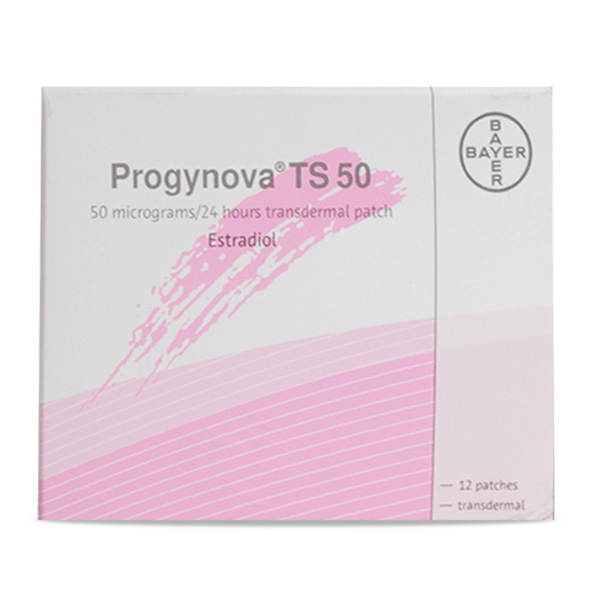Progynova TS Patches

Progynova TS is an oestrogen-only patch applied to the skin once weekly.
Progynova TS Patches are used for Hormone Replacement Therapy (HRT) for oestrogen deficiency symptoms in postmenopausal women more than 1 year postmenopause.

Like any other prescription medication you must consult a doctor before using it. PrivateDoc offers a confidential free consultation service that may result in you receiving a prescription for Progynova TS Patches if it is deemed appropriate and Progynova TS Patches can prescribed safely.

Complete a 100% free and secure consultation to explore your treatment options. How our online prescription consultation works.
What are Progynova TS Patches?
Progynova TS Patches are used for Hormone Replacement Therapy (HRT) for oestrogen deficiency symptoms in postmenopausal women more than 1 year postmenopause.
Prevention of osteoporosis in postmenopausal women at high risk of future fractures who are intolerant of, or contraindicated for, other medicinal products approved for the prevention of osteoporosis.
How much do Progynova TS Patches cost?
Packs and prices
How do you use Progynova TS Patches?
Progynova TS is an oestrogen-only patch applied to the skin once weekly.
Method of administration
Following removal of the protective liner the adhesive side of Progynova TS patches should be placed on a clean, dry area of the skin of the trunk or buttocks. Progynova TS patches should not be applied to the breasts. The sites of application should be rotated, with an interval of at least one week between applications to a particular site. The area selected should not be oily, damaged or irritated. The waistline should be avoided since tight clothing may rub the patch off. The patch should be applied immediately after opening the pouch and removing the protective liner. The patch should be pressed firmly in place with the palm of the hand for about 10 seconds, making sure there is good contact, especially around the edges.
The patch should be changed once weekly.
If the patch is applied correctly, the patient can bath or shower as usual. The patch might, however, become detached from the skin in very hot bath water or in the sauna.
Read the Patient Information Leaflet
Pregnancy and lactation
Pregnancy:
- Progynova TS is not indicated during pregnancy. If pregnancy occurs during medication with Progynova TS treatment should be withdrawn immediately.
- The results of most epidemiological studies to date relevant to inadvertent foetal exposure to oestrogens indicate no teratogenic or foetotoxic effects.
Lactation:
- Progynova TS is not indicated during lactation.
Side effects
Like all medicines, this medicine can cause side effects, although not everybody gets them.
The following diseases have been reported more often in women using HRT compared to women not using HRT:
- breast cancer
- abnormal growth or cancer of the lining of the womb (endometrial hyperplasia or cancer)
- ovarian cancer
- blood clots in the veins of the legs or lungs (venous thromboembolism)
- heart disease
- stroke
The following is a list of side effects that have been linked to the use of Progynova TS patches:
- breakthrough bleeding at unexpected times (see also section 2 ‘HRT and cancer’)
- breast tenderness
- breast pain These side effects occur during the first few months of treatment with Progynova TS patches. They are usually temporary and normally disappear with continued treatment. If they do not, contact your doctor.
Common side effects (may affect up to 1 in 10 people):
- depression, dizziness, nervousness, lack of energy, increased sweating, hot flushes
- headache
- wind, nausea
- itching or rash at the site of application
- fluid retention, weight gain
- irregularities in your menstrual period, changes in vaginal discharge
- generalized pain Uncommon side effects (may affect up to 1 in 100 people):
- increase in blood cholesterol
- anxiety, inability to sleep, apathy, mood swings, poor concentration, extreme feelings of euphoria, tremor, agitation, altered sex drive
- pins and needles
- migraine
- visual disturbance, dry eye
- palpitations
- superficial inflammation of the veins (phlebitis), high blood pressure
- breathlessness, runny or blocked nose
- increased appetite, constipation, indigestion, diarrhoea, rectal disorder
- unusual bleeding or bruising under the skin (purpura)
- acne, hair loss, dry skin, nail problems, small skin swellings, excessive hair growth
- joint pain, muscle cramps
- increased and frequent urge to pass urine, urinary incontinence, bladder infections (cystitis), discoloured urine, blood in the urine • benign growths in the lining of the womb, thickening of the lining of the womb, problems with the womb, swollen breasts, tender breasts v022_0 Page 10 of 11
- tiredness, irregular blood tests, high temperature, lack of energy, feeling generally unwell Additional side effects reported by healthcare professionals:
- reduced oxygen flow to the brain or to a section of the brain (see Section 2 ‘Stroke’)
- abdominal pain, bloating, yellowing of the skin or eyes (jaundice)
- exacerbation of hereditary angioedema (swelling of face, tongue and/or throat and/or difficulty swallowing, hives, breathing difficulties)
- contact dermatitis
- fibroids The following side effects have been reported with other HRTs:
- gall bladder disease
- a variety of skin disorders: o discoloration of the skin especially of the face and neck known as “Pregnancy patches” (chloasma) o painful reddish skin nodules (erythema nodosum) o rash with target-shaped reddening or sores (erythema multiforme
This is only a summary, please refer to patient information leaflet provided or link below for comprehensive list. Patient Information Leaflet
Get Started How much do Progynova TS Patches cost?Contraindications
Progynova TS Patches should not be used by women with any of the following conditions:
- Known or suspected oestrogen dependent malignant tumours, e.g. endometrial cancer
- Undiagnosed genital bleeding
- Untreated endometrial hyperplasia
- Previous or current venous thromboembolism (deep venous thrombosis, pulmonary embolism)
- Known thrombophilic disorders (e.g. protein C, Protein S, or antithrombin deficiency, see section 4.4)
- Active or recent arterial thromboembolic disease (e.g. angina, myocardial infarction)
- Acute liver disease, or history of liver disease as long as liver function tests have failed to return to normal
- Porphyria
- Hypersensitivity to the active substance or to any of the excipients listed
The expert team leading our online clinics
PrivateDoc is happy to introduce you to some of our leading UK licensed clinicians.







